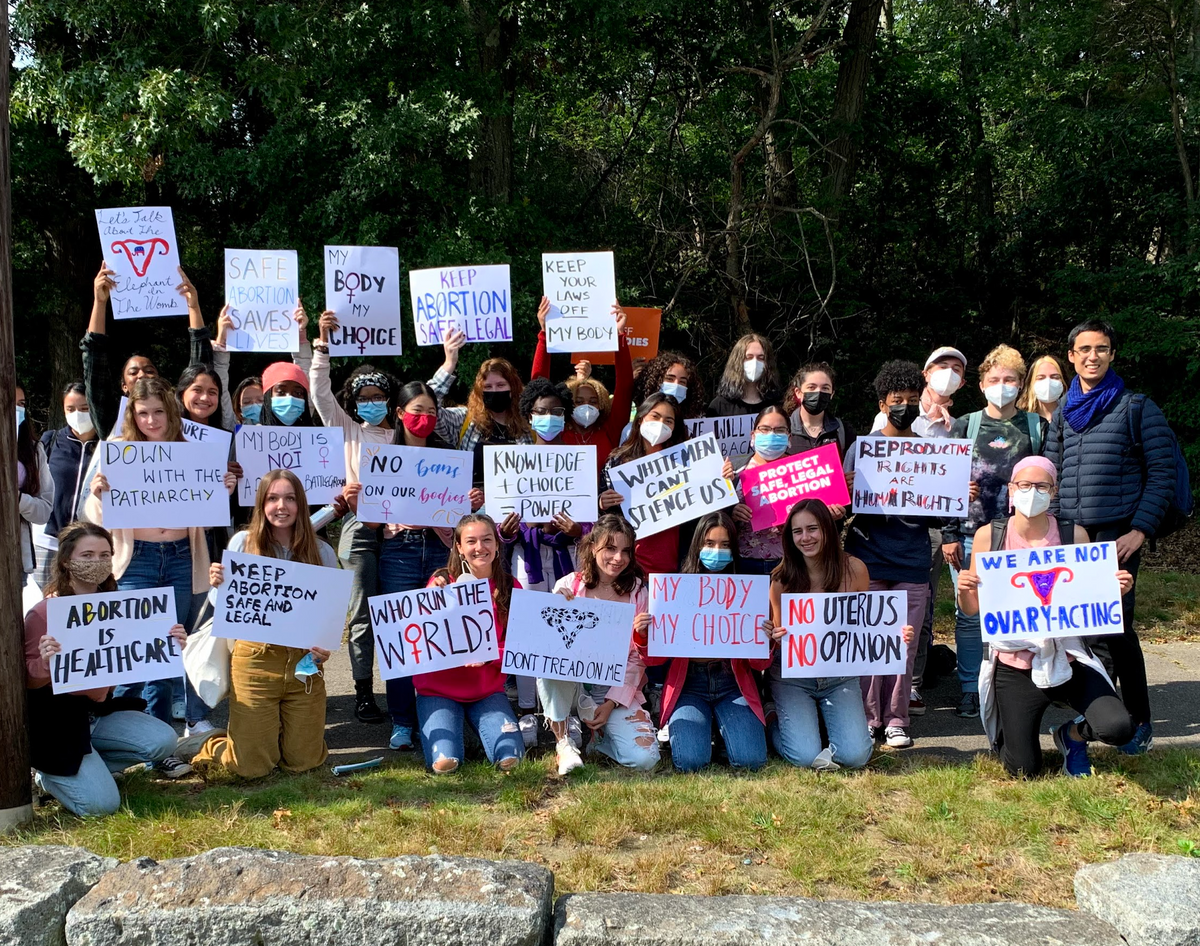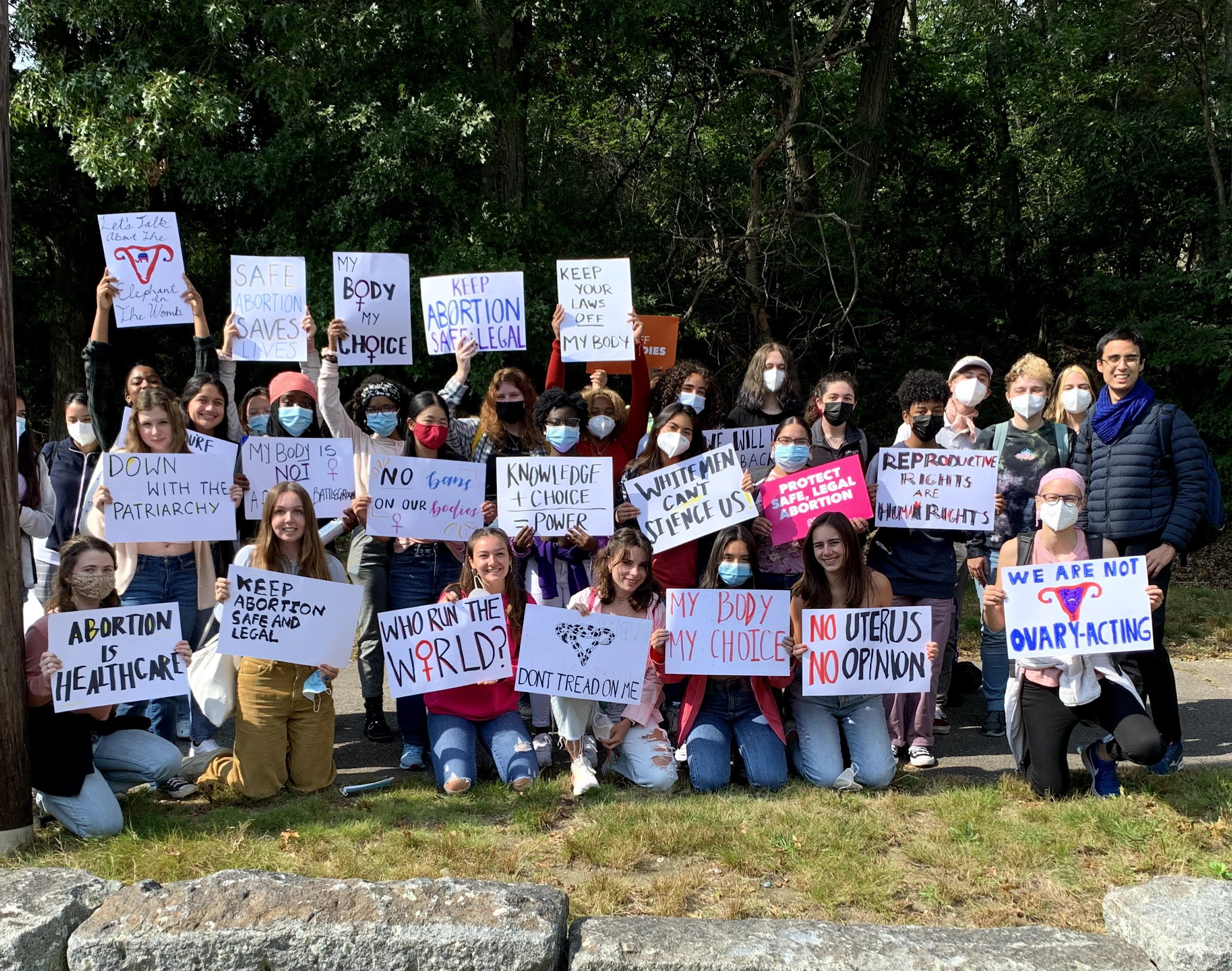Students Rally for Abortion Rights in Boston Women’s March
Nearly 30 students attended the Boston Women’s March on Oct. 2 in a trip sponsored by ACDemocrats. Students expressed feeling empowered by the opportunity to make their voices heard on the issue of reproductive rights in the country.


Nearly 30 students traveled to the fifth annual Women’s March in Boston’s Franklin Park Playstead on Oct. 2 for a trip sponsored by ACDemocrats. Students attended the rally that preceded the march — during which several elected officials and women’s rights advocates spoke on the struggle for abortion rights — but were not able to participate in the actual march. Organized by Sophie Goldsmith ’24, the trip provided students the opportunity to join other women and allies in supporting the cause for reproductive healthcare.
This year’s Women’s March was a response to the most recent jeopardization of reproductive rights across the country, including the attack on the right to safe and legal abortions in states like Texas. The march took place two days before the Supreme Court reconvened for its yearly term — which will review Dobbs v. Jackson Women’s Health Organization, a challenge to a Mississippi law banning abortions after around 15 weeks of pregnancy. The review will allow the Supreme Court to revisit the precedent set in the landmark case Roe v. Wade, prompting women’s rights organizations across the nation to gather and urge the Court to uphold the constitutional right to abortion.
Goldsmith told The Student that she began the process of planning the Boston march trip nearly a month ago, after hearing that the Texas abortion law was upheld by the Supreme Court. Due to the Covid restrictions in place at the time, she was nervous that the plan would receive pushback from the college. Instead of being met with resistance, however, Goldsmith reported that she was encouraged by the administration to continue organizing.
Speaking from her own experience with activism, Goldsmith said that “planning the march was important to me because I really want to give people this feeling of empowerment and that they are being heard [that] has meant a lot to me in the past.”
Students who attended the march expressed similar sentiments as Goldsmith, with Malia Chun ’24 voicing that she felt the march was important to attend because “it is important to get out there and make some noise to show the Court that we care about having access to safe and legal abortions.” Chun shared that she chose to take part in the march because she wanted to “be in a place where [she] felt empowered by other women and people who believe that it is a women’s right to choose.”
The march was organized as a rally that transitioned into a march after several elected officials and women’s rights advocates had spoken on the movement for reproductive freedom. Due to time constraints, students were able to stay for the rally, but not the march portion of the event.
Massachusetts Senator Edward Markey made an appearance at the rally to express his commitment to fight for the constitutional right to a safe abortion for every person, regardless of their race and income. “Abortion access is not a political issue — it is a people issue,” he declared.
Congresswoman Ayanna Pressley spoke at the rally as well, highlighting her own personal connection to the fight for reproductive freedom. She shared that, throughout her childhood, Pressley’s mother had instilled her with the responsibility to struggle for the liberation for all marginalized people, a struggle that her mother said she was born into. Encouraging everyone to get involved in the movement, Pressley stated that “the power of the people has always been stronger than the people in power.”
Massachusetts Attorney General Maura Healey discussed the political context that has allowed for challenges to abortion rights, claiming “we are in this mess” because the Supreme Court has been systematically stolen by the G.O.P. She explained that, over the past 10 to 20 years, Republicans have strategically taken over state legislatures and subsequently have gerrymandered their districts. She questioned how it is possible that eight out of 10 Americans support Roe v. Wade, yet Texas and other states are passing laws banning abortions, remarking that the outcome is “anti-democratic by definition.”
Author and poet Mo Durden recited an original poem titled “In an Alternate Universe My Body Is Mine.” Her poem details the countless things that she would do in a world where she did not live in fear due to existing as a woman. “What a delicious day to leave your keys in your bag and out of the spaces between your fingers,to take the pepper spray off of your key ring,'' Durden said.
In response to Durden’s poem, Zoe Strothkamp ’24 reported feeling angry that the universe Durden imagines is fictional. Strothkamp explained that she is angry on behalf of women who live in fear on a daily basis as a result of a society that does not acknowledge a woman’s body as her own.
Sydney Wishner ’24 echoed her urgency, commenting that “having access to reproductive rights is really important for everyone’s safety and health and it is scary how much this is being challenged.”
Revival Afolabi ’25 expressed feeling very motivated by those who spoke. “The people who spoke were really powerful,” she said after listening to the rally. “I’m ready to march now.”





Comments ()